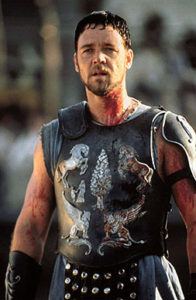Reel vs. Real: Gladiator I
I love history and historical fiction. I love to read it, write it and watch it. When an epic hits the big screen, I eagerly plunk down my money, buy popcorn, cheer the good guys, and boo the bad guys. It’s fun, but I have no illusions about the accuracy of the historical content. Movie producers are first and foremost entertainers who want to earn a profit from their product. Part of the entertainment for me is seeing what they get right and what they get wrong. Gladiator is the first in my “Reel vs. Real” series where I explore what is real behind the reel. These won’t be movie reviews, but a way to get at the history behind the entertainment.
Ridley Scott directed Gladiator, which came out in 2000. I watched it in the theater and recently reviewed the DVD. So let’s check the facts about the characters:
Marcus Aurelius (Richard Harris) was a philosopher king as portrayed in the movie and was considered the last of the “good emperors.” However, the movie would have us believe he wanted to return the Roman Empire to a Republic and Commodus, his rejected son, murdered him. In reality, the emperor doted on his son, raised him to co-ruler in 177 and, when Marcus Aurelius died in 180 (probably of plague), the senate and army enthusiastically acclaimed Commodus as emperor.
Commodus (Joaquin Phoenix) was nineteen when he assumed the diadem and, in typical teenage fashion, rejected everything his father stood for. The movie actually cleaned up some of his monstrousness – Gibbon dates the Decline from Commodus’ reign. Among his many excesses he renamed Rome “Colony of Commodus,” kept hundreds of women and boys for his sexual pleasure, and executed wealthy men to confiscate their property. He also fought as a gladiator over seven hundred times, but didn’t die in the arena–all his opponents were too scared of hurting him and being executed. After reigning thirteen years, his familiars became so afraid, his favorite concubine poisoned him and a wrestler strangled him in his weakened condition.
In the movie, Lucilla (Connie Nielson), Commodus’ sister is a virtuous widow who wants to help realize her father’s dream of returning Rome to a Republic and enlists the help of the honorable senator Gracchus (Derek Jacobi) in her cause. The titular gladiator is to lead the revolt. In real life, Lucilla married her father’s co-emperor Lucius Verus and got a taste for ruling and power. When Verus died, she married an elderly man named Pompeianus, but soon got bored with private life. Lucilla plotted against her brother; was caught, sentenced to exile in 182, and murdered on her brother’s order in 183.
Which brings us to the gladiator. In the movie, Maximus (Russell Crowe), the honorable general-turned-slave-turned-gladiator, avenges the murder of his family by killing Commodus in gladiatorial combat. Maximus did not exist. Commodus did execute two well-regarded brothers named Maximus and Condianus who served as Roman Consuls in 151, but there is no record of a General Maximus from Spain. An ex-soldier named Maternus might have inspired part of the story. He gathered bands of deserters, broke open prisons, and incited slaves to revolt. He forged these dregs into an army which terrorized the rich cities of Gaul and Spain then split up his men and sent them in disguise over the Alps to Rome. Maternus planned to murder Commodus and take over the throne during the tumultuous festival honoring Cybele. He was betrayed and executed.
I enjoyed the movie immensely, but its most grievous historical fault is in leading us to believe that after Commodus’ death, Rome passed into the hands of wise Lucilla and honorable Gracchus. All is well in the Roman Empire and American moviegoers have their happy ending.
It didn’t happen.
After Commodus’ murder at the hands of his concubine and wrestler friend, his Praetorian Guard handpicked an elderly man of impeccable reputation named Pertinax and very soon resented their haste. The new emperor reversed Commodus’ largess toward the Guards. After only eighty-six days, the Praetorians assassinated the virtuous Pertinax and put the imperial throne up for sale to the highest bidder. This ended the era of the Antonines and the Roman Empire plunged into chaos which lasted over 100 years.
So Gladiator is top entertainment and gets some of the gladiator stuff right (see my post on Busting Gladiator Myths),but it falls woefully short of good history. Good thing I didn’t expect anything different!
Would you like a free gladiator story?
Join Faith’s monthly newsletter list and get the free eBook:
We Who Are About To Die



Wow…love this backstory. For history buffs and fans of the truth, I think you could develop this concept into a profitable business. I always remember my father complaining when weaponry or ship rigging were anachronistic…it was always fun to hear this. Think about blowing this out to the world at large!
I love when a movie comes out or is about to come out and the History Channel or Learning Channel will do a program on the true story/history.
Thanks! Stay tuned for my piece on the HBO series “Rome.”
It’s nice to have some of the historical background hashed out in a more organized fashion than when I studied Rome in college. Gladiator is a fun and reasonably good movie, though there are a few key issues with it. On another historical note, they completely botch the depiction of Roman warfare in the initial battle with the Germans. Such a Roman army would not likely win by breaking formation at the instant the melee begins! My other gripe is the movie’s hypocritical attitude towards violence. It puts words into Maximus’ mouth that suggest it is trying to condemn the bloodlust of the arena’s blood games, but then it showcases the violence rather gratuitously for the purpose of making money. This is why I think it fails to be a truly great movie, in spite of having many other good elements to recommend it.